|
|
|
Sort Order |
|
|
|
Items / Page
|
|
|
|
|
|
|
| Srl | Item |
| 1 |
ID:
078698
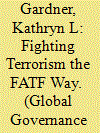

|
|
|
|
|
| Publication |
2007.
|
| Summary/Abstract |
An effective counterterrorist strategy must reflect the adaptive and trans-national nature of terrorism. The challenge presented to lead organizations in the fight against terrorism is assessing threats and understanding terrorist group behavior with the goal to structure and implement an effective transnational response. The fight to capture and shut down terrorist financing requires coordination points, flexibility, and robust commitment by states. The importance of the structure of such a response is central to the question of state compliance. The success of the Financial Action Task Force makes it an ideal case study for effective measures in response to the particular challenges of funding of global terrorism. This article details how the FATF has become adaptive, facilitating transnational effectiveness in the fight to counterterrorist financing and compliance through globally recognized standards, peer review evaluations, and sanctions
|
|
|
|
|
|
|
|
|
|
|
|
|
|
|
|
| 2 |
ID:
078700
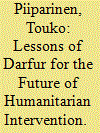

|
|
|
|
|
| Publication |
2007.
|
| Summary/Abstract |
The emergence of post-September 11 military operations in the context of the global fight against terrorism in general and the Iraq war in particular has overshadowed humanitarian interventions conducted by multilateral institutions. However, the threat posed by genocidal governments deserves the continuing attention of global governance because their draconian policies and mobilization capacities constitute the actual weapons of mass destruction against civilian populations. The tardy response of the international community to atrocities in Darfur has been widely regarded as a backlash of the emerging norm in international society which attributes a responsibility to protect civilians targeted by génocidaires. This article, however, will argue that the United Nations, the African Union, the European Union, and NATO have in fact devised and implemented two innovative peacekeeping strategies in Darfur that have set more optimistic precedents for humanitarian intervention, namely, a new division of labor between regional and international organizations and a pragmatic turn in peacekeeping. By dint of these new strategies, intervening organizations have an opportunity to counterbalance the deep-seated problems that routinely affect peacekeeping operations, namely, the body-bag syndrome and the rigidity of bureaucratic norms that regulate PKOs.
|
|
|
|
|
|
|
|
|
|
|
|
|
|
|
|
| 3 |
ID:
078702
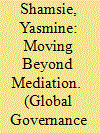

|
|
|
|
|
| Publication |
2007.
|
| Summary/Abstract |
In 1995-1996 the hemisphere's multilateral forum, the Organization of American States, launched a conflict prevention and management program in Guatemala entitled "Culture of Dialogue: Development of Resources for Peacebuilding in Guatemala." The overarching goal was to help Guatemalans address ongoing tensions and political disputes, particularly related to the implementation of the historic peace accords. This article provides a detailed account of this OAS attempt to prevent and diffuse conflict, suggesting that it represents a novel effort that draws heavily on the conflict transformation approach to conflict management. Still, it argues that, at the conceptual level, there appears to be a disconnect between this approach to conflict prevention and the Organization's broader approach to peacebuilding, which embraces a free-market path to development, including the implementation of market-oriented economic reforms.
|
|
|
|
|
|
|
|
|
|
|
|
|
|
|
|
| 4 |
ID:
078699


|
|
|
|
|
| Publication |
2007.
|
| Summary/Abstract |
Facing sophisticated, resistant, and highly motivated terrorist and trans-national crime threats and numerous difficulties inherent in countermeasures, law enforcement and security providers have shifted from a bureaucratic and hierarchical approach toward a networking morphology. This trend more adequately equalizes the capacities of law enforcement authorities to combat fluid and flexible criminal networks. This article highlights new cooperation mechanisms that are being added to the existing instruments available to law enforcement agencies. The emphasis is on the role of informal initiatives by members of the law enforcement community. Based on the generally accepted assumption that state-driven initiatives generally constrain the level of contributions that formal international agreements can provide, we suggest that the staff of international organizations alter the environment in which law enforcement agencies must collaborate. This will enable the organizations to act as informal entrepreneurs that thrive in building the capacity of states to enhance their participation rates in international systems of information exchange and joint strategy development.
|
|
|
|
|
|
|
|
|
|
|
|
|
|
|
|
| 5 |
ID:
078703
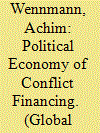

|
|
|
|
|
| Publication |
2007.
|
| Summary/Abstract |
This article argues that an emphasis on natural resources in conflict financing is unhelpful. Instead of focusing on individual methods of conflict financing, conflict economies should be approached as a combination of financing strategies. This opens new space for analyzing the vulnerability of organized armed groups. The article shows that organized armed groups are rational, have multiple sources of financing, and shift from one to another as a function of their needs. They operate in a structural environment that facilitates conflict financing. This challenges the effectiveness of multilateral policy against conflict financing and the viability of postconflict peace-building. If the availability of revenue sources can affect the dynamics of armed conflict, policy against conflict financing holds a promising potential for peacebuilding
|
|
|
|
|
|
|
|
|
|
|
|
|
|
|
|
| 6 |
ID:
078701
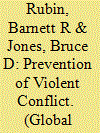

|
|
|
|
|
| Publication |
2007.
|
| Summary/Abstract |
In endorsing the recommendations of the High-level Panel on Threats, Challenges and Change, then UN Secretary-General Kofi Annan committed to strengthening the organization's function to prevent armed conflict. A review of the UN's track record in the three types of conflict prevention-operational, structural, and systemic-shows its success has been limited to cases of interstate conflict between smaller powers. Serious political and institutional obstacles will continue to thwart the UN in preventing wars between powerful states or managing internal conflicts. However, the renewed prevention agenda offers an opportunity to Secretary-General Ban Ki-moon and his team to refocus the UN's efforts to take advantage of the organization's potential as a catalyst and strategic center of political action while keeping a realistic view of its capabilities to implement conflict prevention in different contexts.
|
|
|
|
|
|
|
|
|
|
|
|
|
|
|
|
|
|
|
|
|